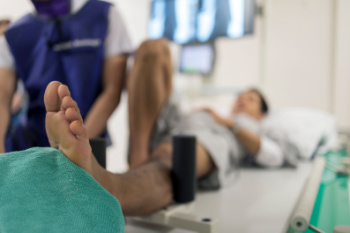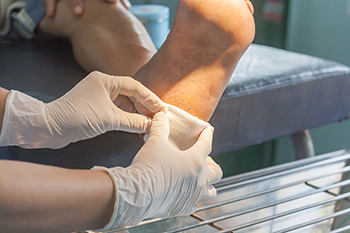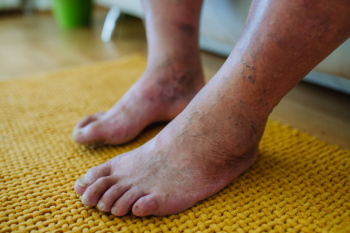Items filtered by date: April 2024
Stress Fractures of the Foot and Lower Leg
 Stress fractures are small cracks in the bones of the foot or lower leg, typically resulting from overuse or repetitive force. Athletes or those engaging in high-impact sports like running, basketball, or dance are more likely to get stress fractures. These injuries can also occur in people who suddenly increase their physical activity without proper conditioning, or those with poor nutrition or weakened bones. One of the main symptoms of a stress fracture is a sharp pain that worsens with activity and improves with rest. The affected area is often sensitive to the touch and may show signs of swelling. The pain is typically localized, making it feel worse during movements that put stress on the specific bone. Preventing stress fractures involves gradually increasing activity levels, wearing appropriate footwear, and incorporating strength training to enhance bone density. If a stress fracture is suspected, a podiatrist can confirm the diagnosis with imaging tests like X-rays or MRI scans. The doctor may recommend rest, possibly immobilization, and a gradual return to activity to ensure proper healing and prevent further injury. If you suspect a stress fracture, it is suggested that you promptly schedule an appointment with a podiatrist.
Stress fractures are small cracks in the bones of the foot or lower leg, typically resulting from overuse or repetitive force. Athletes or those engaging in high-impact sports like running, basketball, or dance are more likely to get stress fractures. These injuries can also occur in people who suddenly increase their physical activity without proper conditioning, or those with poor nutrition or weakened bones. One of the main symptoms of a stress fracture is a sharp pain that worsens with activity and improves with rest. The affected area is often sensitive to the touch and may show signs of swelling. The pain is typically localized, making it feel worse during movements that put stress on the specific bone. Preventing stress fractures involves gradually increasing activity levels, wearing appropriate footwear, and incorporating strength training to enhance bone density. If a stress fracture is suspected, a podiatrist can confirm the diagnosis with imaging tests like X-rays or MRI scans. The doctor may recommend rest, possibly immobilization, and a gradual return to activity to ensure proper healing and prevent further injury. If you suspect a stress fracture, it is suggested that you promptly schedule an appointment with a podiatrist.
Stress fractures occur when there is a tiny crack within a bone. To learn more, contact Patrice Antero, DPM from Tuscany Podiatry. Our doctor can provide the care you need to keep you pain free and on your feet.
How Are They Caused?
Stress fractures are the result of repetitive force being placed on the bone. Since the lower leg and feet often carry most of the body’s weight, stress fractures are likely to occur in these areas. If you rush into a new exercise, you are more likely to develop a stress fracture since you are starting too much, too soon. Pain resulting from stress fractures may go unnoticed at first, however it may start to worsen over time.
Risk Factors
- Gender – They are more commonly found in women compared to men.
- Foot Problems – People with unusual arches in their feet are more likely to develop stress fractures.
- Certain Sports – Dancers, gymnasts, tennis players, runners, and basketball players are more likely to develop stress fractures.
- Lack of Nutrients – A lack of vitamin D and calcium may weaken the bones and make you more prone to stress fractures
- Weak Bones – Osteoporosis can weaken the bones therefore resulting in stress fractures
Stress fractures do not always heal properly, so it is important that you seek help from a podiatrist if you suspect you may have one. Ignoring your stress fracture may cause it to worsen, and you may develop chronic pain as well as additional fractures.
If you have any questions, please feel free to contact our office located in Tuscaloosa, AL . We offer the newest diagnostic and treatment technologies for all your foot care needs.
Exercises for Healthy and Strong Feet
 Strengthening your feet is important for overall well-being, reducing the risk of injury, and maintaining foot health over time. A few simple exercises can go a long way to achieving this. Toe scrunches involve placing a small towel on the floor and gripping it with your toes, then releasing it. This exercise strengthens the muscles in your feet. Another helpful exercise is toe raises, where you lift your toes while keeping your heels on the ground, and then lower them back down. This helps improve flexibility and stability. Additionally, calf raises are beneficial for foot and ankle strength. Stand with your feet hip-width apart, then rise onto the balls of your feet and lower back down. These exercises can be done regularly at home. Along with proper foot care and checkups from a podiatrist, these regular foot exercises can contribute to improved foot health and reduced risk of injury. If you want to learn about more foot exercises to incorporate, or you have questions about your foot health, make an appointment with a podiatrist today.
Strengthening your feet is important for overall well-being, reducing the risk of injury, and maintaining foot health over time. A few simple exercises can go a long way to achieving this. Toe scrunches involve placing a small towel on the floor and gripping it with your toes, then releasing it. This exercise strengthens the muscles in your feet. Another helpful exercise is toe raises, where you lift your toes while keeping your heels on the ground, and then lower them back down. This helps improve flexibility and stability. Additionally, calf raises are beneficial for foot and ankle strength. Stand with your feet hip-width apart, then rise onto the balls of your feet and lower back down. These exercises can be done regularly at home. Along with proper foot care and checkups from a podiatrist, these regular foot exercises can contribute to improved foot health and reduced risk of injury. If you want to learn about more foot exercises to incorporate, or you have questions about your foot health, make an appointment with a podiatrist today.
Exercising your feet regularly with the proper foot wear is a great way to prevent injuries and build strength. If you have any concerns about your feet, contact Patrice Antero, DPM from Tuscany Podiatry. Our doctor can provide the care you need to keep you pain-free and on your feet.
Exercise for Your Feet
Exercise for your feet can help you gain strength, mobility and flexibility in your feet. They say that strengthening your feet can be just as rewarding as strengthening another part of the body. Your feet are very important, and we often forget about them in our daily tasks. But it is because of our feet that are we able to get going and do what we need to. For those of us fortunate enough to not have any foot problems, it is an important gesture to take care of them to ensure good health in the long run.
Some foot health exercises can include ankle pumps, tip-toeing, toe rises, lifting off the floor doing reps and sets, and flexing the toes. It is best to speak with Our doctor to determine an appropriate regimen for your needs. Everyone’s needs and bodies are different, and the activities required to maintain strength in the feet vary from individual to individual.
Once you get into a routine of doing regular exercise, you may notice a difference in your feet and how strong they may become.
If you have any questions please feel free to contact our office located in Tuscaloosa, AL . We offer the newest diagnostic and treatment technologies for all your foot and ankle needs.
Charcot Foot and Foot Ulcers

Charcot foot, also known as Charcot neuroarthropathy, is a condition characterized by progressive weakening and degeneration of the bones and joints in the foot or ankle. It often affects individuals with peripheral neuropathy, such as those with diabetes. One significant complication of Charcot foot is the development of foot ulcers, which can result from pressure points and trauma due to the structural changes in the foot. These ulcers are particularly problematic as they can lead to serious infections and even amputation if left untreated. Unfortunately, Charcot foot and its associated ulcers may go undiagnosed or misdiagnosed initially due to symptoms resembling other foot conditions or neuropathic pain masking typical signs of inflammation. Podiatrists provide comprehensive care for Charcot foot including diagnosis, wound care, orthotic interventions, and patient education to prevent complications and improve the quality of life for affected individuals. If you feel a weakening in your feet or ankles, it is strongly suggested that you schedule an appointment with a podiatrist for a proper diagnosis and treatment. If you have Charcot foot, early intervention can thwart severe problems.
Wound care is an important part in dealing with diabetes. If you have diabetes and a foot wound or would like more information about wound care for diabetics, consult with Patrice Antero, DPM from Tuscany Podiatry. Our doctor will assess your condition and provide you with quality foot and ankle treatment.
What Is Wound Care?
Wound care is the practice of taking proper care of a wound. This can range from the smallest to the largest of wounds. While everyone can benefit from proper wound care, it is much more important for diabetics. Diabetics often suffer from poor blood circulation which causes wounds to heal much slower than they would in a non-diabetic.
What Is the Importance of Wound Care?
While it may not seem apparent with small ulcers on the foot, for diabetics, any size ulcer can become infected. Diabetics often also suffer from neuropathy, or nerve loss. This means they might not even feel when they have an ulcer on their foot. If the wound becomes severely infected, amputation may be necessary. Therefore, it is of the upmost importance to properly care for any and all foot wounds.
How to Care for Wounds
The best way to care for foot wounds is to prevent them. For diabetics, this means daily inspections of the feet for any signs of abnormalities or ulcers. It is also recommended to see a podiatrist several times a year for a foot inspection. If you do have an ulcer, run the wound under water to clear dirt from the wound; then apply antibiotic ointment to the wound and cover with a bandage. Bandages should be changed daily and keeping pressure off the wound is smart. It is advised to see a podiatrist, who can keep an eye on it.
If you have any questions, please feel free to contact our office located in Tuscaloosa, AL . We offer the newest diagnostic and treatment technologies for all your foot care needs.
Daily Habits for Diabetic Foot Care
 Daily habits for diabetic foot care are essential to prevent complications that can arise from diabetes, such as infections and ulcers. Regular inspection of the feet for cuts, blisters, or red spots can help address any issues head-on. It is also important the feet are kept clean and moisturized, while avoiding lotion between the toes to prevent fungal infection. Proper shoe choice can enhance comfort and prevent blisters. It is helpful not to walk barefoot to reduce the risk of injury. Additionally, managing blood sugar levels helps maintain healthy circulation and nerve function in the feet. Regular check-ups with a podiatrist play a key role in diabetic foot care. These foot doctors can professionally assess the health of your feet, provide specialized care for any issues detected, and offer personalized advice on proper foot care practices. These visits help in early detection and treatment of potential foot problems, reducing the risk of serious complications. If you are a diabetic patient at risk for foot complications, it is suggested that along with daily foot care, you add a podiatrist to your health care team.
Daily habits for diabetic foot care are essential to prevent complications that can arise from diabetes, such as infections and ulcers. Regular inspection of the feet for cuts, blisters, or red spots can help address any issues head-on. It is also important the feet are kept clean and moisturized, while avoiding lotion between the toes to prevent fungal infection. Proper shoe choice can enhance comfort and prevent blisters. It is helpful not to walk barefoot to reduce the risk of injury. Additionally, managing blood sugar levels helps maintain healthy circulation and nerve function in the feet. Regular check-ups with a podiatrist play a key role in diabetic foot care. These foot doctors can professionally assess the health of your feet, provide specialized care for any issues detected, and offer personalized advice on proper foot care practices. These visits help in early detection and treatment of potential foot problems, reducing the risk of serious complications. If you are a diabetic patient at risk for foot complications, it is suggested that along with daily foot care, you add a podiatrist to your health care team.
Diabetic foot care is important in preventing foot ailments such as ulcers. If you are suffering from diabetes or have any other concerns about your feet, contact Patrice Antero, DPM from Tuscany Podiatry. Our doctor can provide the care you need to keep you pain-free and on your feet.
Diabetic Foot Care
Diabetes affects millions of people every year. The condition can damage blood vessels in many parts of the body, especially the feet. Because of this, taking care of your feet is essential if you have diabetes, and having a podiatrist help monitor your foot health is highly recommended.
The Importance of Caring for Your Feet
- Routinely inspect your feet for bruises or sores.
- Wear socks that fit your feet comfortably.
- Wear comfortable shoes that provide adequate support.
Patients with diabetes should have their doctor monitor their blood levels, as blood sugar levels play such a huge role in diabetic care. Monitoring these levels on a regular basis is highly advised.
It is always best to inform your healthcare professional of any concerns you may have regarding your feet, especially for diabetic patients. Early treatment and routine foot examinations are keys to maintaining proper health, especially because severe complications can arise if proper treatment is not applied.
If you have any questions please feel free to contact our office located in Tuscaloosa, AL . We offer the newest diagnostic and treatment technologies for all your foot and ankle needs.
Fit Shoes Properly to Avoid Foot Conditions
 Properly fitting shoes help you maintain foot health and avoid a range of foot conditions, including bunions, calluses, and plantar fasciitis. To ensure that your shoes fit correctly, start by shopping in the late afternoon or evening, as feet tend to swell throughout the day. This will help you find a size that accommodates your feet when they are at their largest. Make sure to have both feet measured, as it is common for one foot to be slightly larger than the other. Choose the size that fits the larger foot comfortably. There should be about a thumb's width of space between the end of your longest toe and the front of the shoe to allow for movement and expansion as you walk. The shoe should fit snugly around the heel and midfoot, without being too tight. This will prevent slippage that could lead to blisters or calluses. Choose shoes with a wide toe box that allows your toes to spread naturally without constriction. Also, consider the shoe's material and arch support, especially if you have specific foot conditions or needs. Podiatrists can provide suggestions for the best shoes for your feet, especially if you are suffering from particular foot conditions. It is suggested that you discuss this topic with a podiatrist to reduce the risk of developing foot problems and enhance your overall foot comfort and health.
Properly fitting shoes help you maintain foot health and avoid a range of foot conditions, including bunions, calluses, and plantar fasciitis. To ensure that your shoes fit correctly, start by shopping in the late afternoon or evening, as feet tend to swell throughout the day. This will help you find a size that accommodates your feet when they are at their largest. Make sure to have both feet measured, as it is common for one foot to be slightly larger than the other. Choose the size that fits the larger foot comfortably. There should be about a thumb's width of space between the end of your longest toe and the front of the shoe to allow for movement and expansion as you walk. The shoe should fit snugly around the heel and midfoot, without being too tight. This will prevent slippage that could lead to blisters or calluses. Choose shoes with a wide toe box that allows your toes to spread naturally without constriction. Also, consider the shoe's material and arch support, especially if you have specific foot conditions or needs. Podiatrists can provide suggestions for the best shoes for your feet, especially if you are suffering from particular foot conditions. It is suggested that you discuss this topic with a podiatrist to reduce the risk of developing foot problems and enhance your overall foot comfort and health.
It is important to find shoes that fit you properly in order to avoid a variety of different foot problems. For more information about treatment, contact Patrice Antero, DPM from Tuscany Podiatry. Our doctor will treat your foot and ankle needs.
Proper Shoe Fitting
Shoes have many different functions. They cushion our body weight, protect our feet, and allow us to safely play sports. You should always make sure that the shoes you wear fit you properly in order to avoid injuries and deformities such as: bunions, corns, calluses, hammertoes, plantar fasciitis, stress fractures, and more. It is important to note that although a certain pair of shoes might be a great fit for someone else, that doesn’t mean they will be a great fit for you. This is why you should always try on shoes before buying them to make sure they are worth the investment. Typically, shoes need to be replaced ever six months to one year of regular use.
Tips for Proper Shoe Fitting
- Select a shoe that is shaped like your foot
- Don’t buy shoes that fit too tight, expecting them to stretch to fit
- Make sure there is enough space (3/8” to ½”) for your longest toe at the end of each shoe when you are standing up
- Walk in the shoes to make sure they fit and feel right
- Don’t select shoes by the size marked inside the shoe, but by how the shoe fits your foot
The shoes you buy should always feel as good as they look. Shoes that fit properly will last longer, feel better, and improve your way of life each day.
If you have any questions, please feel free to contact our office located in Tuscaloosa, AL . We offer the newest diagnostic and treatment technologies for all your foot care needs.



